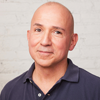
PHOTOGRAPHING THIS ISSUSE'S COVER had added meaning for the staff of San Francisco’s Glide Foundation who took part in the shoot. The day marked the first anniversary since the death of Orlando Chávez, a colleague and leading activist who fought for wider access to hepatitis C (HCV) medications in the Bay Area.
When Glide created its community (or peer) navigation program in August 2018, it was named in honor of Chávez. The program trains people are vulnerable to or who have been treated for HCV to use their life experiences to connect to others in their community. Located in San Francisco’s Tenderloin district, Glide is at ground zero where HCV, drug use, and poverty converge. The community navigators have overcome, or are still dealing with, many of the challenges that they are now helping others face.
“People with lived experience have the potential to be highly effective navigators because of their connection to the community—shared life experience may build the foundation of trust, rapport, and connection, and it is understood that connection lays the groundwork for positive, healthy changes,” said Harm Reduction Programs Director Paul Harkin, who photographed the cover. For Harkin, having community peers in the mix of program activities has always been crucial.
The photo shoot participants all came from Glide’s second cohort of community navigators, who began their training in April 2019. The group was trained by outreach coordinator William Buehlman and community health outreach worker Amber Sheldon. Navigators Elena Atyim and Zack Hickson graduated with the original cohort, but returned to help Buehlman and Sheldon teach the class.
Orlando Chávez’s work continues in his name. A few of the newly minted community navigators who took part in the photo shoot talked about why their work is important to them:
John Nelson: “After my treatment and eventual cure of hep C in just eight weeks, and with no side effects, I was encouraged to seek out those who were not aware of the new treatments. I committed myself to educate them in the same way I was, and to get them into HCV treatment.”
Elena Atyim: “I’ve been fighting for the lives of people living with hepatitis C because I lived with the disease. No one should have to live with hep C, because today we can treat everyone.”
Zach Hickson: “I cured my hep C, and I want to help others to do the same—no matter where they are in their life.”
Orin Allen: “This cohort has been educational as well as enjoyable—getting to work with harm reduction staff; getting people tested, linked to care, and being trained in overdose prevention is meaningful.”
Jack MacLennan: “Harm reduction has been improving my life for years. Hep C has affected my family and friends, and is a big part of why I do this work. It’s inspired me to want to help end hep C.”
—Rick Guasco


